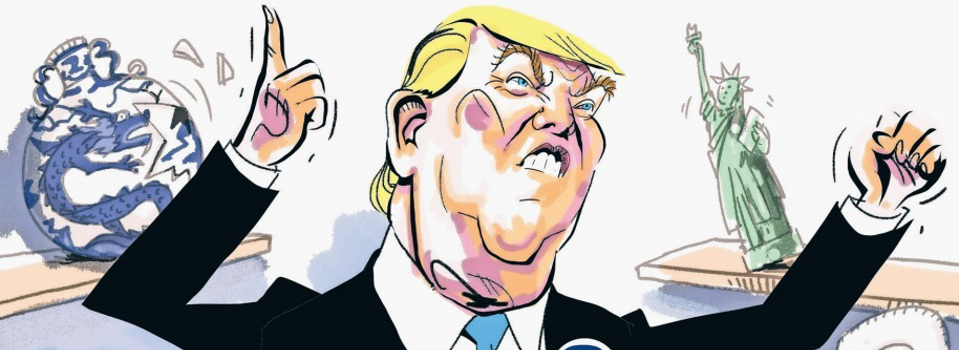American Republican presidential contender Donald Trump’s comments on Muslims reveal the xenophobic underside of politics in the United States. The controversy generated by his call to ban Muslims from entering the country has subsided already, and he would no doubt moderate his views if he got in to power.
However, the political damage has been done to American relations with Asia. Asians would be more comfortable with a mainstream American leader who is responsible and nuanced in his or her response to global events such as the trajectory of Islam or the rise of China. Democratic presidential contender Hillary Clinton would fit the bill nicely.
Admittedly, Trump was dipping into a pool of fear created by the mass shooting in California carried out by a Muslim couple. Not everyone who supported him is a bigot or a racist. Like people everywhere, Americans want to be safe from terrorists. Their sense of vulnerability was revived when the couple’s reprehensible action was associated with the pathological Islamic State. It seeks to destabilise the West through armed attacks mounted from within.
However, the US is hardly a stranger to gun violence, particularly random attacks on innocents carried out by psychopaths acting out of personal or racial hatred or an inchoate desire for revenge. The difference this time was the association of mass violence with a concrete insurgent organisation, Islamic State, rather than an amorphous idea such as racial supremacy. Islamic State’s devotion to the violent overthrow of the global religious order appears to give a veneer of justification to the views of Trump and people like him. But the veneer is just that – an illusion. If left unchecked, such views could create mass hysteria about Muslims in the US.
The consequences would be catastrophic for American Muslims, who would be presented with an oblique choice between their nationality and their faith. Such a choice would run contrary to the traditions of both America, where secularism creates reflective space for religion to flourish, and Islam, whose spirit of religious solidarity does not preclude its adherents from living under different flags.
Muslims in Asia would be deeply worried about the US changing its historical course under a leader whose claim to the country’s highest office – and the most powerful one in the world – is based on a rejection of these two profoundly important traditions.
As it is, the entire thrust of extremist Muslim ideology is to posit irreconcilable differences between “Christian” America (and its Jewish partner, Israel) and the Islamic world – differences that can only lead to warfare. Creditably, thousands of mainstream Muslims who represent the defining strain of moderation in Islam have sought to demonstrate the falsity of the radical dichotomy. From Egypt to Pakistan and from Bangladesh to Indonesia, these Muslims are trying to prevent a manufactured war of civilisations from erupting.
These courageous Muslims are under threat from zealots in their own religion. Now, Trump has tried to lend legitimacy to Islamophobia – the other side of the coin to hatred of the Judeo-Christian world – by casting Muslims as the eternal outsiders of the West, strangers who cannot be trusted within and must be stopped outside the gates. Moderate Muslims are now the target of both Muslim extremists and Western right-wingers.
Asians watching the American presidential nomination process unfold may wonder what a Trump victory would mean for America’s relations with China – another historical entity which, like Islam, has often been treated as the West’s eternally threatening outsider.
Trump’s view of China as primarily a cheater represents a view that hardly anyone would associate with the best and brightest in American strategic thinking.
True, a degree of reservation about China’s political system, human rights practices and military ambitions runs through both sides of the American partisan divide. For example, Hillary Clinton’s outspokenness on human rights has dismayed the Chinese. Also, her time as US secretary of state has steeled her in ways of dealing with a country that is both an American partner (on issues such as anti-terrorism) and a strategic challenger, as in the South China Sea.
As president, Clinton would be expected to combine deftly the two aspects of statecraft – diplomacy and deterrence – that define relations between the two most powerful nations in the world.
However, unlike Trump and the general run of hopefuls contending for the presidency, Clinton possesses a lucid and studied idea of how the world works – sometimes to America’s advantage, sometimes not – and not how Americans, particularly the most parochial among them, would like the world to function perpetually to their national advantage.
Unlike Trump – whose views on Muslims she has criticised roundly – Clinton has the intellectual heft to set America on a course that would not involve a strategic collision with major world forces.
Of course, the winning of the party nomination – to say nothing of the actual presidential race – is a matter for Americans, and only Americans, to decide. However, given their country’s defining influence on the rest of the world, Asians would prefer an American president who refuses to see the world in the Manichean light that Trump does.

